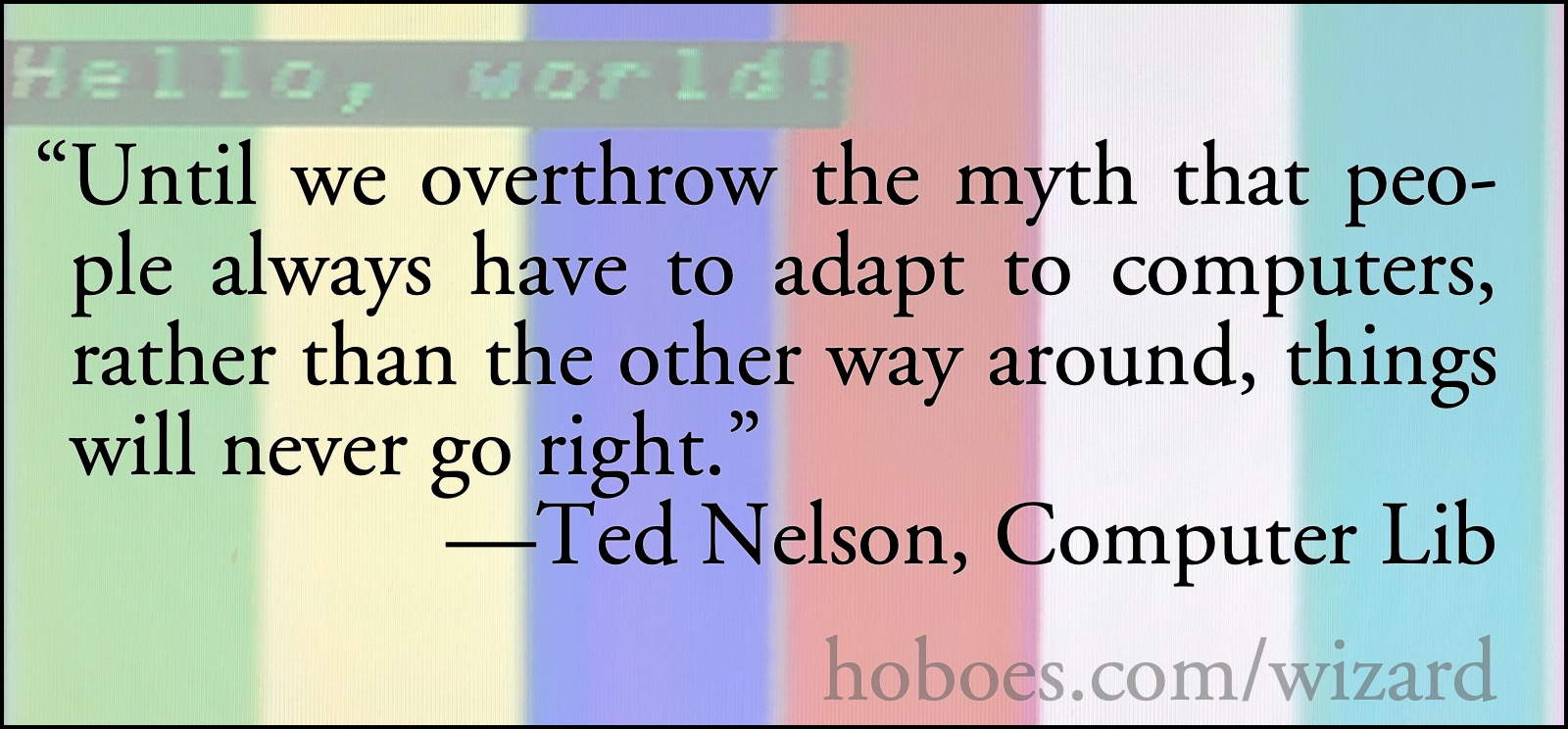Negative Space: technology policy
- All roads lead up
- Whatever happened to programming? It became more interesting.
- Another reason to ban cell phones from schools
- Scales Elementary in Murfreesboro has another reason to ban cell phones: kids might be able to call their parents when they’re about to die. That would put teachers in danger during mass murder drills.
- Anticipating failure
- Whenever a computer expert claims that you won’t have to open the window and that it is okay to seal it shut, require that somewhere on their upgrade they have to include Douglas Adams’s quote about air conditioning.
- Can schools compete with the Internet by clicking?
-
 Fat, drunk, and clicking is no way to go through life.
Fat, drunk, and clicking is no way to go through life.
- Cell phone neo-McCarthyism
- It’s 1976 all over again at Framingham High in Framingham, Massachusetts. “Neo-McCarthyism. I like that.”
- Copyright reform: Republican principles in action?
- Their initial copyright policy brief was a brilliant example of how Republicans could tie small government and freedom to actual, concrete policy changes that will help the average person—while at the same time cutting the rug from under their traditional anti-freedom enemies. It was far too smart to last.
- Face the Music
- MP3s are not the cause of the recording industry’s decline, they are the reason the recording industry remains afloat. The more successful the industry is in blocking open audio formats, the more the industry will decline in the long-term.
- Health care reform: walking into quicksand
-
 The first step, when you walk into quicksand, is to walk back out. Health providers today are in the business of dealing with human resources departments and government agencies. Their customers are bureaucrats. Their best innovations will be in the fields of paperwork and red tape. If we want their innovations to be health care innovations, their customers need to be their patients.
The first step, when you walk into quicksand, is to walk back out. Health providers today are in the business of dealing with human resources departments and government agencies. Their customers are bureaucrats. Their best innovations will be in the fields of paperwork and red tape. If we want their innovations to be health care innovations, their customers need to be their patients.
- IT’s rarefied view of obsolescence
- In IT, where everyone ends up trying to get the latest equipment, it is easy to forget that the rest of the world keeps using things until they are no longer useful.
- King Ludd
- There are some decisions that should be left to experts, and some that should not. It makes sense that if you leave acquisitions to experts, they will recommend acquiring what they’re familiar with. And if you acquiesce to a popular vote only among experts, they will naturally choose a course of action that requires more experts.
- Learning to program without BASIC
-
 If BASIC is dead, how can our children—or anyone else—learn to program? Today people interested in programming have far more options available to get started hacking their computers.
If BASIC is dead, how can our children—or anyone else—learn to program? Today people interested in programming have far more options available to get started hacking their computers.
- The Macintosh SE/30: Forward-Looking Design
-
 In 1990, a USD team of faculty and programmers created an interactive, multimedia history and ethics project, now on display on a Macintosh SE/30 in my office.
In 1990, a USD team of faculty and programmers created an interactive, multimedia history and ethics project, now on display on a Macintosh SE/30 in my office.
- Macs still easier to use?
-
 Twenty years down, does buying a Macintosh still save help desk time and user trouble? According to IBM, it does.
Twenty years down, does buying a Macintosh still save help desk time and user trouble? According to IBM, it does.
- The presumption of ignorance
- From movie theaters to classrooms to jury rooms, there’s an assumption that forced ignorance is possible. But it isn’t, it never has been, and it’s only going to get more obvious.
- The Real Y2K Bug
- The real Y2K bug is that we’re teaching our software suppliers that they can make money by writing buggy software.
- Save Me Time, Save Yourself Trouble: Buy Macintosh
- Why the Internet support specialist wants you to buy Macintosh. Hell hath no fury like a Windows user who discovers the Macintosh advantage.
- Scripting your iPhone
- Will scripting your iPhone be disallowed? Why?
- Strangling the iPhone of health care
-
 We have no idea what great improvements in health care we have strangled through our current system of government regulations, subsidies, and tax incentives.
We have no idea what great improvements in health care we have strangled through our current system of government regulations, subsidies, and tax incentives.
- What is your favorite color?
- This is why I don’t like password recovery schemes that ask question which are public knowledge.
- Why should everyone learn to program?
-
 Anything that mystifies programming is wrong.
Anything that mystifies programming is wrong.
More Information
- Review: Future Shock
-
“This is an amazing book; amazing both because of how clearly he showed the failure of bureaucracy as technological and social advancement speeds up, and amazing because of how he cannot see beyond more bureaucracy as the solution.”
- The Dog That Didn’t Bark
-
“People have an inherent tendency to focus on visible and obvious factors when analyzing a situation. This can result in biased data sets and inaccurate conclusions and decisions. When analyzing a situation, ask yourself the following question: Are there dogs that aren’t barking?”
 Fat, drunk, and clicking is no way to go through life.
Fat, drunk, and clicking is no way to go through life.
 The first step, when you walk into quicksand, is to walk back out. Health providers today are in the business of dealing with human resources departments and government agencies. Their customers are bureaucrats. Their best innovations will be in the fields of paperwork and red tape. If we want their innovations to be health care innovations, their customers need to be their patients.
The first step, when you walk into quicksand, is to walk back out. Health providers today are in the business of dealing with human resources departments and government agencies. Their customers are bureaucrats. Their best innovations will be in the fields of paperwork and red tape. If we want their innovations to be health care innovations, their customers need to be their patients. If BASIC is dead, how can our children—or anyone else—learn to program? Today people interested in programming have far more options available to get started hacking their computers.
If BASIC is dead, how can our children—or anyone else—learn to program? Today people interested in programming have far more options available to get started hacking their computers. In 1990, a USD team of faculty and programmers created an interactive, multimedia history and ethics project, now on display on a Macintosh SE/30 in my office.
In 1990, a USD team of faculty and programmers created an interactive, multimedia history and ethics project, now on display on a Macintosh SE/30 in my office. Twenty years down, does buying a Macintosh still save help desk time and user trouble? According to IBM, it does.
Twenty years down, does buying a Macintosh still save help desk time and user trouble? According to IBM, it does. We have no idea what great improvements in health care we have strangled through our current system of government regulations, subsidies, and tax incentives.
We have no idea what great improvements in health care we have strangled through our current system of government regulations, subsidies, and tax incentives. Anything that mystifies programming is wrong.
Anything that mystifies programming is wrong.